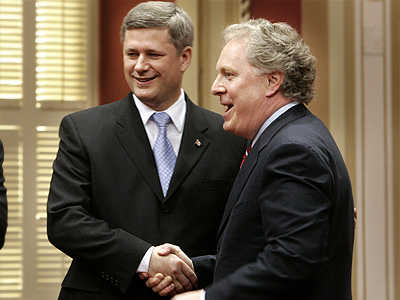Galicia’s premier Alberto Núñez Feijóo on Monday announced that his province, too, would join the Basque Country in holding early regional elections on October 21, rather than waiting for his term to run out in March 2013.![]()
![]()
In so doing, Feijóo (pictured above, right) who hails from the center-right Partido Popular de Galicia (PPdeG, the People’s Party of Galicia), the local version of Spanish prime minister Mariano Rajoy’s Partido Popular (PP, People’s Party), has launched the first electoral test for Rajoy’s government, after just eight months in office.
Given Rajoy’s ties to Galicia and its status as a traditional PPdeG stronghold, it’s very much more fraught for Rajoy (pictured above, left) than the simultaneous Basque election, where two nationalist parties lead polls and where unique local and autonomy issues will figure nearly as much as national issues.
Rajoy’s party won the Spanish general election in November 2011, but his government is already facing mounting unpopularity as it’s made increasing cuts to the Spanish budget, notwithstanding an economy that’s back in recession — the economy has contracted by 0.7% so far this year and grew just 0.4% in 2011 — and an unemployment rate of 24.8%, as of June.
So far, Rajoy has pushed through at least four different austerity packages, designed to bring the Spanish deficit to just 6.3% of Spanish GDP, down from an 8.9% deficit in 2011. Rajoy has raised the Spanish income tax rate, raised the Spanish value-added tax by 3% to 21%, eliminated tax breaks for home owners and reduced spending on education and health care — and that comes after two years of cuts implemented by the government of Rajoy’s predecessor, José Luis Rodríguez Zapatero.
For all its efforts, Spain is still straining under yields on its sovereign debt that rose from 5% (on 10-year bonds) when Rajoy entered office to 6.5% now, down from a crisis-level high of around 7.5% in mid-July. So notwithstanding the harsh austerity, it seems more likely than not that Spain will seek a bailout from the European Union, possibly later this year — earlier in June, the European Central Bank intervened to provide funds for ailing Spanish banks. That, too, has caused Rajoy to lose credibility after promising that he would never seek a bailout during his campaign.
The austerity push has affected the regions, which are responsible for cutting their own budgets to a combined 1.5% of GDP, and Galicia has not been unaffected by cuts at the regional level.
Since the end of the Franco era, the PPdeG has been out of power for just four years. As such, it will be somewhat of an embarrassment if Feijóo and the PPdeG cannot win reelection in a region that’s historically been a bastion of Spanish conservatism — Rajoy himself is from Galicia and who once himself served in the Parlamento de Galicia.  Continue reading Galicia regional elections will be the first test of Rajoy’s austerity measures
Continue reading Galicia regional elections will be the first test of Rajoy’s austerity measures


